Visi nuolat girdime, kad bet kokia reklama yra gera reklama. Bet ar tikrai taip? Dar svarbiau, ar SEO yra tas pats? Mes visi girdėjome apie nuorodų kūrimo techniką, naudojant nesusietus prekės ženklo paminėjimus. Tai geras metodas ir, kiek žinome, jis veikia labai gerai.
Bet ką daryti, jei nesusietas prekės ženklas, apie kurį jūs taip jaudinatės, pasirodo esąs „RipoffReport“ įrašas? Ką daryti, jei tai yra tinklaraštininkas, skundžiantis jūsų paslaugas, ar naujienų leidėjas, pranešantis apie kokį nors incidentą, susijusį su jūsų prekės ženklu?
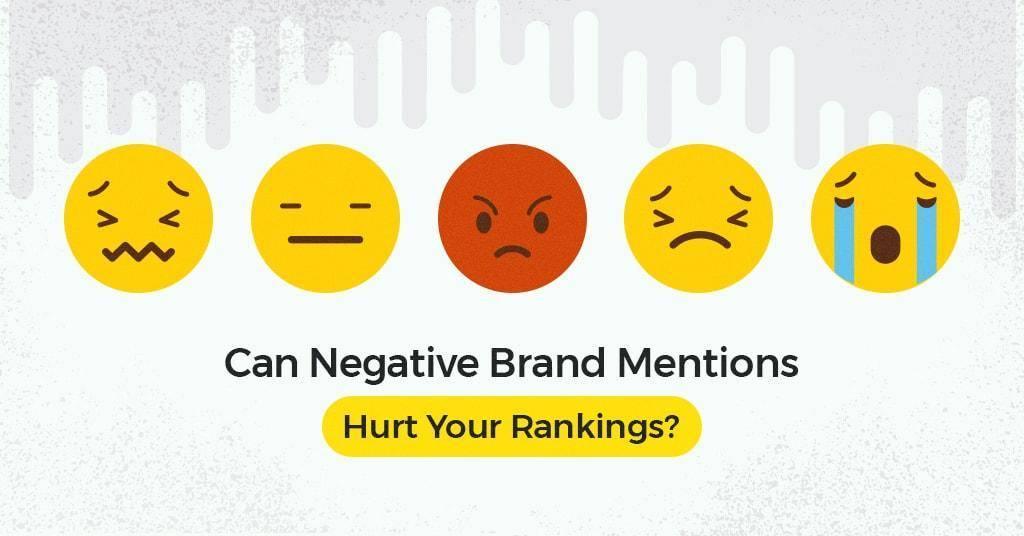
- Kaip interneto prekės ženklo paminėjimai veikia SEO šiandien
- Prekės ženklo inkaro teksto atgalinės nuorodos
- Nesusieti prekės ženklo paminėjimai arba „Google“ numanomos nuorodos
- Firminės paieškos užklausos
- Kaip „Google“ traktuoja neigiamus prekės ženklo paminėjimus
- „Google“ paieškos kokybės vertintojo gairės
- Kaip veikia „Google“ algoritmas
- Ar neigiamos prekės ženklo nuorodos turės įtakos jūsų „Google“ reitingams?
- Ar visa reklama yra gera reklama?
- Neigiamų paminėjimų tvarkymas paieškos požiūriu
- Neigiamų paminėjimų tvarkymas atgalinių nuorodų požiūriu
- Dirbtinio intelekto vaidmuo
- Kaip elgtis su neigiamais prekės ženklo paminėjimais
- Kaip rasite savo neigiamus paminėjimus
Ar taip pat turėtumėte gauti nuorodą iš tokio tipo šaltinių? Ar tai jums padės, ar pakenks jūsų svetainės reitingams? Na, jūs netrukus sužinosite!
Šiame straipsnyje mes išsiaiškinsime, kaip „Google“ elgiasi su šiuo klausimu, ir išsiaiškinsime, ar neigiami prekės ženklo paminėjimai daro įtaką jūsų reitingams ir SEO pastangoms. Taigi, skaitykite toliau.
1. Kaip interneto prekės ženklo paminėjimai veikia SEO šiandien
Apskritai visi žinome, kad geras prekės ženklas ir PR teigiamai paveiks mūsų verslą. Tai logiška. Žmonės mėgsta nusistovėjusius prekių ženklus, turinčius daug patenkintų klientų ir puikius pasiūlymus.
Pavyzdžiui, dauguma žmonių vis tiek pirktų „iPhone“ per „Xiaomi“ telefoną, nors kai kurie modeliai, matyt, pasižymi panašiomis savybėmis ir mažesnėmis kainomis. Žmonės perka iš tam tikrų prekės ženklų dėl pasitikėjimo ir autoriteto. Norint gauti auditorijos pasitikėjimą, prekės ženklas turi būti gerai įsitvirtinęs ir turėti gerą PR.
Kad jūsų verslas klestėtų internete, be klientų ir auditorijos pasitikėjimo, jūs taip pat turite laimėti paieškos variklio pasitikėjimą.
Klientų ir paieškos variklių pasitikėjimas yra lygiagretus, tačiau, iš to, ką žinome, SEO veikia remdamasis kai kuriais algoritmais. Yra daug svarbių veiksnių, lemiančių autoritetą, nuo domeno amžiaus ir saugumo iki atgalinių nuorodų, PR ir firminių paieškų. Mes nepaisysime domeno amžiaus, nes tai iš tikrųjų nėra kažkas, ką mes galime kontroliuoti, tačiau mes sutelksime dėmesį į kitus.
1.1 Prekės ženklo inkaro teksto atgalinės nuorodos
Kaip pateikiama šiame nuorodų kūrimo pamokų straipsnyje , svetainės, kuriose yra didelis firminių inkaro teksto atgalinių nuorodų procentas, paprastai reitinguojasi aukščiau nei tos, kuriose yra didelis komercinių inkaro teksto atgalinių nuorodų procentas.

Ekrano kopija iš pažintinio „SEO“ įrankio, rodanti pagrindinio tinklalapio inkaro teksto paskirstymą savo nišoje
Šio reiškinio priežastis tikriausiai yra „Google“ sąsaja su šiais ryšiais su natūralumu. Kalbėdami apie jus žiniatinklyje, žmonės labiau linkę susieti jūsų svetainę naudodami firminį ar URL inkaro tekstą, o ne per komercinį inkaro tekstą.
1.2 Nesusieti prekės ženklo paminėjimai arba „Google“ numanomos nuorodos
Svetainėje taip pat gali būti daug nesusietų prekės ženklų paminėjimų visame žiniatinklyje. Jie dažnai vadinami citatomis ir yra labai populiarūs vietiniame SEO lauke .
Nors tai tikriausiai nesuteikia tiek daug SEO vertės, kiek daro atgalinės nuorodos, jie tikrai turi įtakos. „Google“ iš tikrųjų turi patentą , todėl žinome, kad tai tiesa. Jis apibrėžia jas kaip numanomas nuorodas:
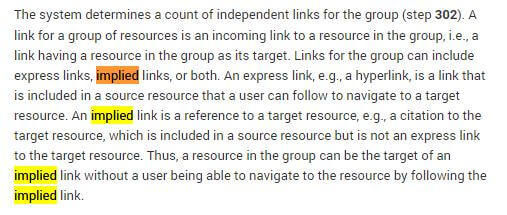
Ekrano nuotrauka iš „Google“ patento, apibrėžianti numanomas nuorodas
Pagrindinis elementas čia yra aktualumas. Vietos įmonės citatos turėtų atspindėti jūsų įmonės vietą. Jei esate Sietle, bet gausite citatų iš rusų svetainių, kuriose dažniausiai minimi Rusijos verslai, naudojantys kirilikos simbolius, nesitikėkite, kad jūsų reitingai augs labai greitai.
Kita vertus, jei jūsų verslas nukreiptas į pasaulinę rinką, tikslinga įvairiose šalyse visokius nesusijusius paminėjimus. Atitinkamas turinys taip pat yra svarbus, todėl nešlamškite kiekvienoje svetainėje.
Be to, nepamirškite, kad minėjimai, kuriuose yra atgalinių nuorodų, ypač dofollow, turi daug didesnę įtaką jūsų paieškos sistemoms, nei paminėjimai, kurie neturi.

Kaip nesusieti paminėjimai lyginami su susietaisiais.
Tai – grandininiai šarvai. Gauti? … couse … ji turi nuorodų? (ba dum tsss)
Taigi, paprastai kalbant, „Google“ išnagrinėja jūsų nesusijusius prekės ženklo paminėjimus ir turinį, kuris juos supo, tačiau geriau, jei iš jų galite gauti nuorodą į savo svetainę. Tokiu būdu galite būti tikri, kad maksimaliai padidinsite minėjimo potencialą, nes tai yra ir paminėjimas, ir nuoroda tuo pačiu metu.
Ir atminkite, kad norite gauti paminėjimų iš patikimų svetainių, susijusių su jūsų niša ir geografiniu taikymu, nesvarbu, ar jos būtų susietos, ar nesusietos. Jų susikūrimas naudojant tą patį IP gali būti laiko švaistymas ir gali iš tikrųjų sukelti problemų.
Puikus būdas susieti jūsų nesusijusius dalykus yra prekės ženklo paminėjimai , žiniatinklio paminėjimų stebėjimo įrankis. Jame yra daug pažangių funkcijų, tačiau tai yra viena iš geriausių, nes tai leidžia užmegzti ryšį su žiniatinklio valdytojais, kurie jus pamini ir galbūt įsigyja nuorodą.
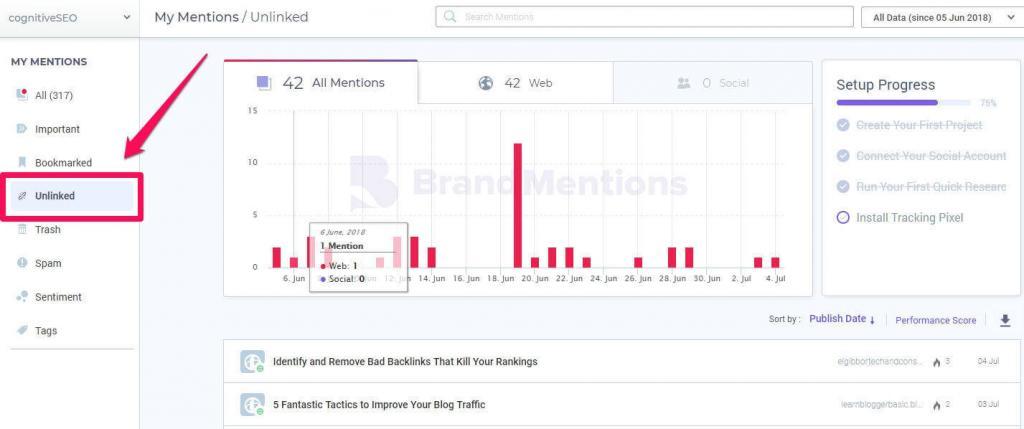
Ekrano nuotrauka iš prekės ženklo paminėjimo įrankio, rodanti potencialą atrasti nesusijusius žiniatinklio paminėjimus
1.3 Firminės paieškos užklausos
Paieškos užklausas galime suskirstyti į du tipus: firminius ir ne firminius. Ne firminė paieškos užklausa būtų „raktinių žodžių įrankis“, o firminė – „kognityviųjų SEO raktinių žodžių priemonė“.
Jūs norite būti reitinguojami pagal juos abu. Jei nevertinate savo prekės ženklo, tai yra blogai. Arba pasirinkote neteisingą prekės ženklo pavadinimą, arba esate labai nubaustas paieškos sistemų.
Kiekvienas iš jų turi laimikį:
Pavyzdžiui, ne firminių raktinių žodžių paieškos apimtis yra didelė, o tai reiškia daug potencialių klientų. Tačiau ten yra didelė konkurencija, todėl juos reitinguoti yra sunkiau, o PR gali būti mažesnis.
Kita vertus, firminių raktinių žodžių turbūt yra maža paieškos apimtis, tačiau juos labai lengva reitinguoti (jei jūs esate tas prekės ženklas), o konversijų rodikliai yra labai aukšti, nes paprastai vartotojai jau žino, ko nori.
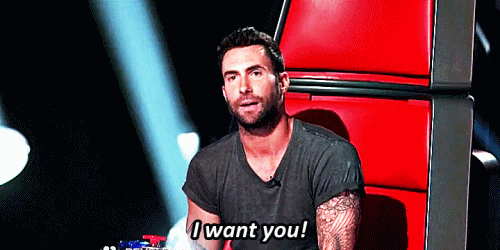
Nors tai yra spekuliacinis, kai kurie eksperimentai ir stebėjimai (įskaitant kai kuriuos mūsų pačių) parodė, kad firminiai raktiniai žodžiai ilgainiui gali padidinti ne prekės ženklo raktinių žodžių reitingą. Taigi, jei daugelis žmonių ieško „jūsų prekės ženklas + raktinis žodis“ ir spustelėja jūsų svetainę, turėtumėte pastebėti ir paties „raktinio žodžio“ reitingų padidėjimą.
Randas Fishkinas taip pat sutinka su tuo ir paaiškina savo šiame „Whiteboard Friday“ vaizdo įraše:
These being said, it’s always a great idea to work on your PR so that people search for your brand on the web and associate products with your brand. Not only will it increase conversion rates, but it can also help with rankings on non-branded keyword versions.
2. How Does Google Treat Negative Brand Mentions
Ok, so we know that Google likes branded anchor text links and looks at brand mentions across the web to establish your website’s authority.
But, in real life, having more mentions isn’t necessarily better. What if you have thousands of negative reviews, mentions related to fraud or other bad stuff? That could affect you business deeply, or even send it into bankruptcy.
2.1 Google’s Search Quality Evaluator Guidelines
Google’s algorithms can’t yet determine what is good and what is bad. That’s why the company has set up a team of humans (around 10,000 or so) to take care of the job. The initiative doesn’t only target brand mentions. The purpose of these evaluators is to help improve the quality of the search results in general.
Unlike the manual spam team, which can apply manual actions on websites, the search quality evaluators can’t directly influence search rankings. Instead, they follow these guidelines to evaluate websites and provide feedback about the search results to Google.
From the guidelines, we can observe that Google demands the lowest rating to be given to websites with negative or malicious reputation.
One criteria would be harmful pages that contain malware or that are phishing for information (page 37), but we can also see on page 43 that the evaluators should consider low BBB ratings and other sources that expose fraudulent behavior.
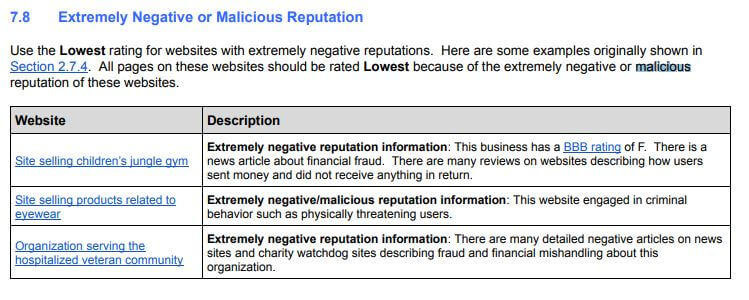
Screenshot from the Search Quality Guidelines
We can also include the issue of Fake News. Fake News websites purposely create these fake stories as shocking as possible, not to influence people necessarily, but to gain hype on social media, which brings traffic to their websites which eventually makes them money from ads.
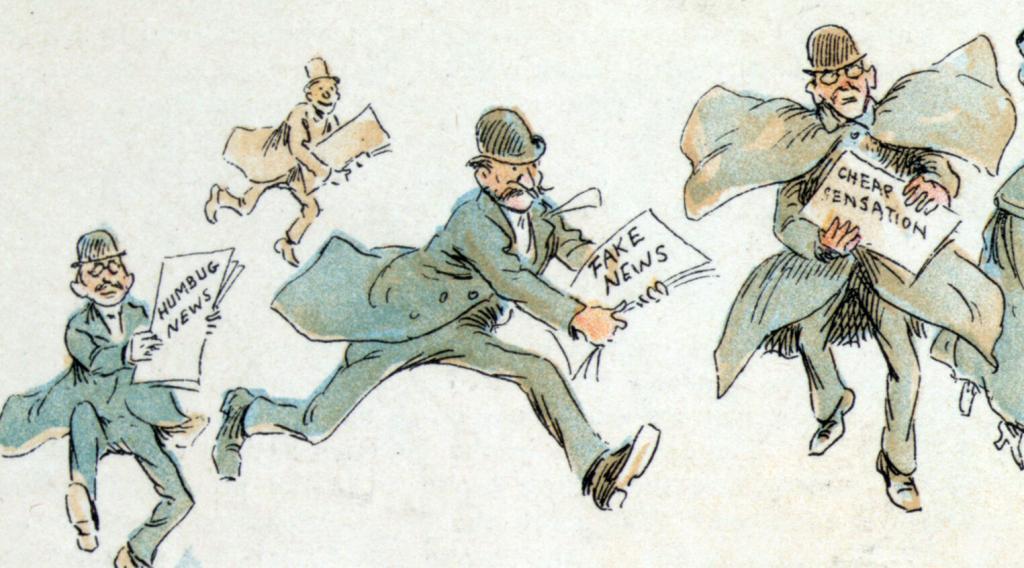
These fake stories can ultimately even rank high in Google for specific keywords. Fake News have a big impact on Political Campaigns, as messages spread through Fake News often influence the decisions of uninformed and naive voters.
You can watch the following video for reference about why fake news are so popular:
So far, it’s a known fact that social media hype, backlinks and a lot of mentions can get you ranking at the top. Unless the story is critically dangerous, such as one that incites to violence, it can rank there for a very long time without any manual action being taken.
Google also has an initiative in which they will work closely with journalists to combat fake news. The search quality evaluators also play an important role, as they can provide patterns that fake news websites use, which can help the algorithm raise a red flag much easier.
However, the subject is a lot more sensitive. Malaysia, for example, has passed a law against fake news which could be punished with over $100,000 in fines and up to 6 years of jail time. This raises questions about free speech and corruption (in that particular case). Same thing goes with Google, as they would literally have to censor some websites if they consider them to be fake news websites by not giving them a chance to rank for certain keywords.
2.2 How The Google Algorithm Works
After the evaluators provide their feedback and Google compiles the info, it gets fed to the algorithm. This way, over time, Google starts understanding the patterns of fake news or malicious websites and websites with a very bad reputation.
It’s hard to tell what exactly the algorithm will be based on, but I can speculate looking for reviews in structured data or similar implementations, articles related to fraud or other criminal activities and even news sites or videos. It can then follow patterns, affecting an entire server or network of similar sites related in any way with the initial penalized low quality/reputation website.
One thing’s for sure: Google’s algorithms will be constantly improving and will eventually be able to understand if a business has a very bad reputation or if it’s involved in any suspicious or criminal activities.
3. Will Negative Brand Mentions Affect Your Google Rankings?
If we’re only talking about a small part of your customers leaving negative reviews or a couple of bloggers trashing you for not accepting their promotion offer, there’s nothing to worry about. In fact, it might actually benefit you if you can get backlinks.
However, if we’re talking about massive PR drops, thousands of complaints, serious fraud and the press going crazy over it, then yes, it probably will. But not in the way you might think it will. To be more exact, it won’t directly impact your rankings, but they will ultimately drop because of other indirect factors.
3.1 Is All Publicity Good Publicity?
If you know about the White Moose Cafe, then you probably know about all the scandals regarding the vegans and the bloggers. If not, here’s some input:
So there are actually two stories. One is about some vegan complaining about the restaurant having no vegan food in it. The vegan community started blasting the Hotel’s (yes it’s actually a Hotel not a Cafe) Facebook page with 1 star reviews. The hotel then started mocking the vegan community.
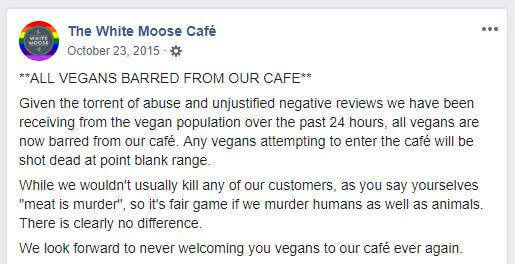
This created a lot of hype with more vegans turning red and massively hitting the 1 star review button but, on the other side, there were a lot of people defending the White Moose Cafe.
More recently, a similar story took place after a YouTube content creator asked for free accommodation in exchange for exposure on her channel. The Hotel’s owner mocked her and the bloggers community started rolling in with 1 star reviews. The owners now posted about banning all bloggers from their hotel, just as with vegans, above.
Again, a lot of people were defending the White Moose Cafe and, after all this hype, the hotel’s Facebook Page still stands at 4.4 out of 5 stars.
The White Moose Cafe kept pumping their jokes by sending the blogger a bill for publicity services, topping over $6 million. While it might sound exaggerated, it’s actually pretty accurate. Considering the amount of hype the posts got around social media and how many news publications caught up on the story, the price seems fair. The blogger actually gained a fair 10,000-20,000 subscribers and most of her complaint videos were monetized.
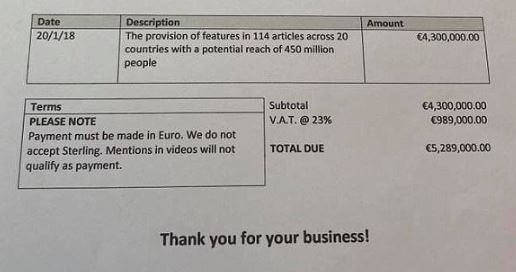
Paul, the owner of the White Moose Cafe, actually has a great post about this in which he elaborates upon the topic and explains how controversy can be a great way of promoting your business, as long as you don’t get trashed completely (what if it was all actually a setup and they actually worked together?). The secret is to also have one side defending your point of view. Another thing you can do is simply ask questions instead of expressing an opinion.
While I don’t actually agree with trolling and insulting other people for publicity, I have to admit that I find it kind of funny at the same time, being both a vegan and a blogger myself. Paul has some strong points of view and reading through his blog you can actually see that he’s not a bad person.
Now these aren’t really negative brand mentions, as overall, the hotel seems to have gained more than it lost. But there are some that might actually get you into trouble.
3.2 Handling Negative Mentions From a Search Point of View
When users search the web, they often look for reviews. If it’s a product, they look for other people who have previously bought and used it. If it’s a service, they look upon other client’s experiences.
Reviews have a big impact on the purchase decision of a client, as the following survey shows:
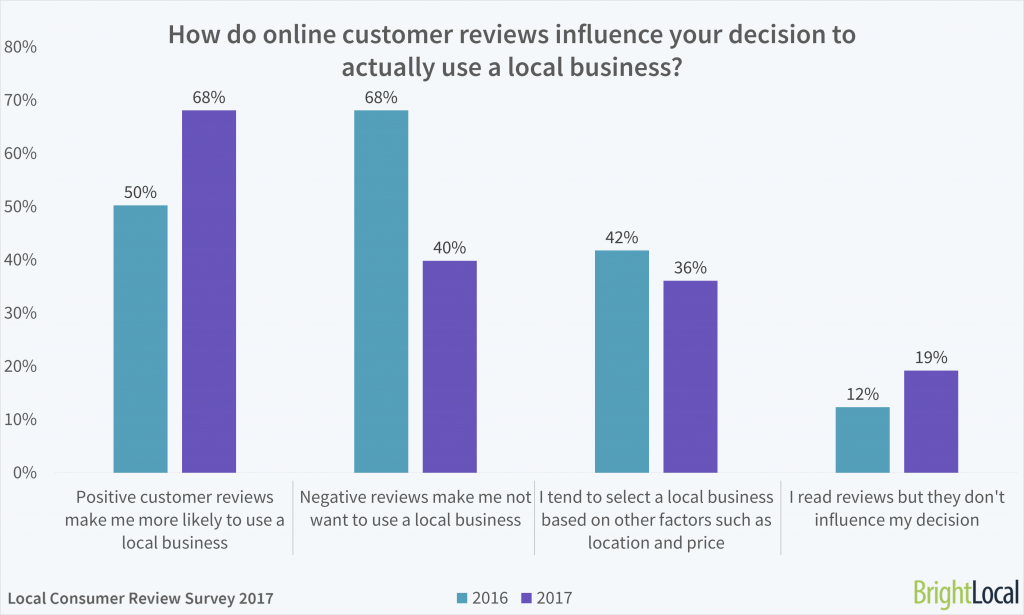
Now some people are aware that not all negative reviews are accurate, but there are some review sites that are very trustworthy or, better said, credible. One of them, for example is RipoffReport, which lists scams, usually in the digital marketing field. People can comment on them, so usually there’s a community of people complaining instead of just an individual.
I had this user interested if they can make a RipoffReport post mocking one of his clients rank lower, as it was occupying one of the first 5 positions on their main brand search.
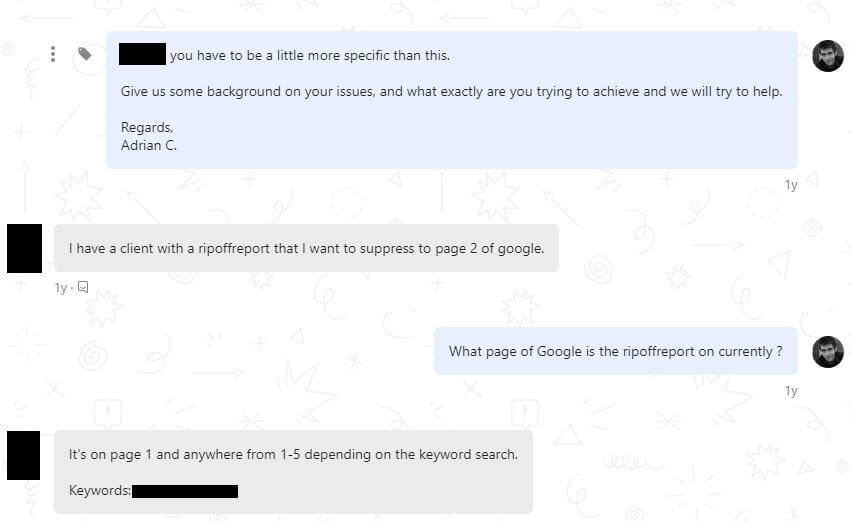
Screenshot from Intercom showing discussion. I censored the user’s name, photo and website for protection.
I told him that the only thing he can do is get the post removed somehow, although I knew he didn’t have any chances. I can’t show off the Google results as I’d probably have to black out 99% of the image, but you have my word, that RipoffReport is ranking high for their brand name and, considering the things said in that post, it doesn’t look very good for the company.
If you’re in a similar situation or your overall number of reviews is under 3 stars, then you should consider taking serious action on the quality of your products / services. Sometimes it might not be entirely your fault. For example, people might be complaining about slow shipping. But if it is so, then change the shipping company you work with.
People really care about reviews and if they avoid your website because of this, it kind of resembles a bad user experience, which we know Google cares a lot about and could potentially affect your rankings.
If this also results in a lower number of branded searches for your website, then it might also have a negative impact on your rankings.
3.3 Handling Negative Mentions From a Backlinks Point of View
As long as the link isn’t coming from malicious websites with malware or a very spammy link profile, I can’t really see how they could directly affect your rankings.
If someone wants to give you as a negative example, they might or might not link to you. However, if they do link, they will probably will do it through nofollow links which will still benefit your rankings.
So far, we don’t have any data on links surrounding negative mentions, but we do know that links from malicious or spammy websites are bad.
The only way they could affect you is that users from the article that speaks badly about you might be able to land on your website, resulting into more negative reviews.
3.4 The Role of Artificial Intelligence
Eventually, we will reach a point where Google will become true AI. At that point, whatever the search quality evaluators have done so far, Google will be able to do it itself, probably an infinite times better. Fake news will be a thing of the past and the bot might even be able to distinguish between true fake news or hate speech and offenses and jokes.

Image Source: popsci.com
We’re not quite there yet, but it’s definitely something that Google’s trying to achieve. At that point, we’ll probably also reach the singularity and Google will have already found a solution to world hunger and all human problems so we won’t have to worry about SEO anymore.
4. How to Deal With Negative Brand Mentions
Well, the best way of dealing with them is not having them…
No, seriously, if your company is convicted for some sort of crime, you probably have bigger problems on your head. That’s not going to be easy to erase and even if you rebrand yourself, through the power of social media and social justice warriors you can’t stay undercover for long.
While you should constantly improve your customer care sector, there are some natural negative reviews and brand mentions that you can’t avoid with 100% accuracy. People are more likely to leave a review after a negative experience than they are after a positive one, so you’re already at a disadvantage.
The best way of dealing with negative reviews is to answer them, deal with them, learn from them and improve your services.
Sometimes, people are jerks. They rate your product or service 1 star for no real reason. For example, I’ve seen people just saying “It’s a bad product” without specifying why and others leaving a 1 star reviews because it didn’t match their expectations, comparing a low end product with a high end one, even though it was a good value for the price.
However, by explaining your point of view in the comments you have the opportunity to get your side of the story listened to. For example, I’ve recently read a comment in which one client was complaining about the CPU not matching his socket and that he sent it back but the store wouldn’t accept the return. The store replied and said that the CPU’s pins were damaged and that they even tried to repair it themselves but didn’t succeed.
By addressing the issues in the negative reviews, not only can you turn a customer’s frown into a smile but you can also show the other clients that you care, that you are sorry for what happened and that you are willing to learn and improve.
4.1 How do you find Your Negative Mentions
It’s hard dealing with negative brand mentions if you can’t track them, don’t you think? Well, Brand Mentions actually has a great feature that can sort out the good from the bad and make your life a lot easier.

Reputation management from Brand Mentions
So, if you want to manage your reputation you can always use the sentiment analysis feature, segment your mentions and deal with them a lot better.
Conclusion
So, in the end, it seems like negative brand mentions don’t directly impact your search engine rankings. However, if these mentions result in lower branded searches, or if other news sites rank above you on branded queries, then you might eventually suffer some SEO consequences as well
Have you ever experienced bad PR or negative brand mentions? If yes, did it affect your rankings? Did you manage to fix the issue? If yes, how? If not, maybe we can discuss it and find a solution. Feel free to start a discussion in the comments section below.